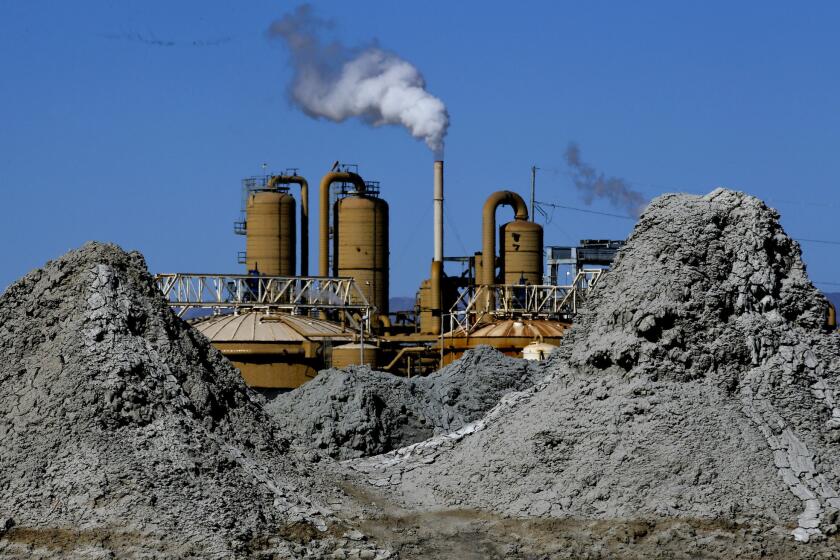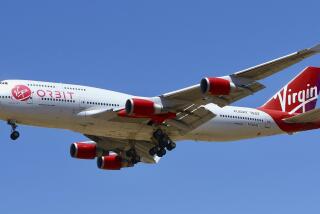Alphabet shuts down its power-generating kites project
- Share via
San Francisco — Google parent company Alphabet Inc. is shutting down its power-generating-kites firm Makani, the first closure of a “moonshot” project since Alphabet founders Larry Page and Sergey Brin stepped back from management in December.
Sundar Pichai, who took over as Alphabet chief executive, is under pressure to stem losses from the company’s Other Bets segment, which includes endeavors such as self-driving cars and internet-providing balloons. Other Bets lost $4.8 billion last year — widening from a $3.4-billion loss in 2018.
Alphabet acquired Makani in 2013 and took the kite company into its experimental X lab. Makani was developing airborne wind turbines that could be tethered to floating buoys, removing the need for the expensive ocean bed structures needed to support permanent turbines.
“It’s been a very hard choice for us,” X lab CEO Astro Teller said Tuesday. “Our estimate of the rewards for the world, the reward to Alphabet, and the risks and costs to get there ... they change over time. It’s part of my job to assess that and make sure that we’re picking the best ones we can for Alphabet to spend its money on.”
Alphabet would not confirm the size of Makani, only saying it consisted of dozens of employees who the parent company hoped could be reassigned to other climate-change-related work at Alphabet. A small team is to stay on for a few months to collate Makani’s research.
Makani’s kites were designed to fly as high as 1,000 feet above the water while attached to floating buoys weighed down with anchors, instead of the full ocean platforms required to support typical offshore wind farms. It was hoped that Makani’s technology could be used in areas of the ocean too deep to set up fixed wind turbines, and where winds are strongest.
As is typical for X companies that show potential for commercialization, Makani was spun out of the lab in February last year after an undisclosed investment from Royal Dutch Shell. In August, Makani held its first test flight off the coast of Norway.
But Alphabet decided the opportunity to greatly disrupt to energy sector had begun to dwindle. Makani at first believed it could provide a competitive advantage by using its technology on land and in shallow water — as well as in deep water — but advancements in competing technologies meant that was likely no longer the case.
“That’s very sad for Makani,” Teller said. “But it’s really great for the world.”
A European Union report published in 2018 concurred with Alphabet’s assessment. “The technology still has a long way to go before it can reach commercialization,” it read, noting that challenges remained in demonstrating the reliable, autonomous operation that would make the concept viable.
Shell said it was “exploring options” to take on Makani’s technology and keep developing it. “Offshore wind has the potential to reach the large-scale generation capacity that society needs to transition to a lower-carbon energy system,” said Dorine Bosman, vice president of Shell Wind Development. “We believe that Makani remains one of the leading airborne-wind technologies in the world.”
Alphabet pointed to other climate change projects within the company, such as drone delivery firm Wing, as an indication that Alphabet is not changing its focus. Teller said investment in moonshots would remain strong under Pichai and Ruth Porat, Alphabet’s chief financial officer.
“The appetite from Sundar and from Ruth for us to continue to make smart, exciting bets about the future has, if anything, gone up,” Teller said.
“Part of the reason that they’re supportive for us to continue to do that is when something doesn’t make sense, we make the hard choices to not continue doing them,” he said. “That’s what buys the ongoing support from Alphabet.”
© The Financial Times Ltd. 2020. All rights reserved. FT and Financial Times are trademarks of the Financial Times Ltd. Not to be redistributed, copied or modified in any way.
After years of playing third fiddle to solar and wind power, new geothermal plants are finally getting built.







